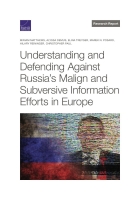The increasing frequency and intensity of information aggression targeting the United States and its European allies demands more thorough consideration of concepts and practices for protecting against, resisting, and mitigating the effects of psychological manipulation and influence.
Russia in particular appears to use messaging and intimidation as part of its efforts to influence multiple actors and countries, including the United States and its European allies. Unfortunately, concepts and practices for understanding and resisting the potential effects of efforts conducted by Russia and its agents are few. To address this, United States European Command (USEUCOM) asked the RAND Corporation to identify strategies for defending against the effects of Russia's efforts to manipulate and inappropriately influence troops, government decisionmaking, and civilians.
The authors describe apparent efforts conducted by Russia and its agents involving the use of information to shape Russia's operating environment, focusing on the European context; review and apply existing research on influence and manipulation to these efforts; and draw from existing practice to describe possible defensive approaches for USEUCOM and its various partners to consider using when defending against these actions. The framework the authors apply offers a way to conceptualize the objectives, tactics, and tools of Russian information efforts in Europe.

No comments:
Post a Comment